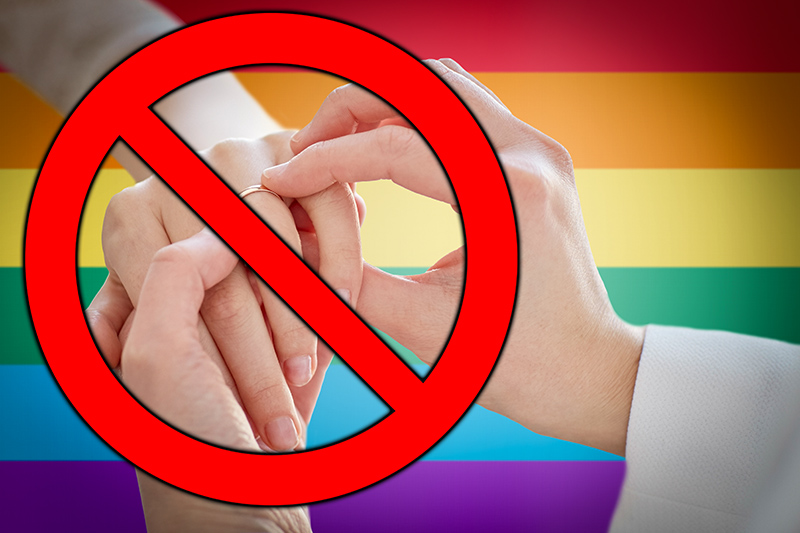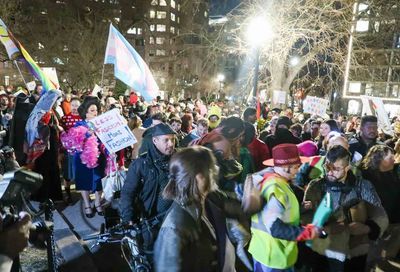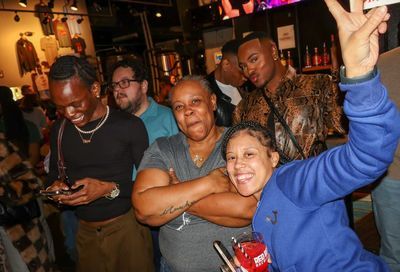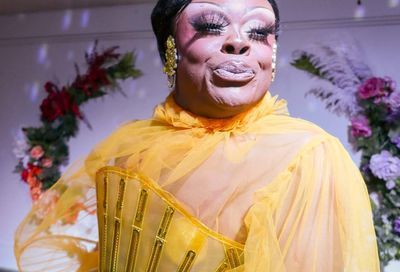Maryland Makes History
Free State is first of four on Election Day to defend marriage equality
With polls closing at 8 p.m. Tuesday, Maryland became the first of four states to defend marriage equality at the ballot box Nov. 6, ending the years-long string of defeats that marriage equality had experienced at ballot boxes in 32 states prior.
With all but four precincts reporting statewide, Question 6, the referendum to uphold the Civil Marriage Protection Act granting same-sex couples the right to obtain a Maryland marriage license, was leading by more than 103,000 votes, a margin of 51.9 to 48.1 percent.
According to results from the Maryland State Board of Elections, Question 6 passed in Baltimore City and in five of the state’s remaining 23 counties: Montgomery, Howard, Anne Arundel, Frederick and Baltimore. Supporters also limited their losses in other counties, coming up short by little more than 4,000 votes in populous Prince George’s County, where the concept of marriage equality had not long ago been losing by double digits, according to a January 2012 poll by The Washington Post.
Voters in Maine and Washington state also approved ballot measures similar to Question 6 Tuesday, while in Minnesota – where same-sex marriage is not legal – voters declined to add a state constitutional amendment defining marriage as the union solely between a man and a woman.
With Tuesday’s wins, Maryland becomes one of nine states – plus the District of Columbia – to legalize marriage equality. Same-sex couples will have access Maryland marriage licenses starting Jan. 1, 2013, with some pro-gay ministers saying they are planning to hold marriage ceremonies at midnight on New Year’s Day.
Supporters of Question 6, led by Marylanders for Marriage Equality, a coalition of labor, religious and community groups, had been particularly active in their messaging and outreach efforts to voters, particularly religious voters and African-Americans.
”Fairness and equality under the law won tonight,” Josh Levin, the campaign manager for Marylanders for Marriage Equality, said in a statement after the race was called in the campaign’s favor. ”We’re sure to feel the ripples of this monumental victory across the country for years to come.”
Levin also thanked Gov. Martin O’Malley (D), who had signed the Civil Marriage Protection Act into law in March, and the LGBT Caucus of the Maryland General Assembly, whose members were particularly instrumental in swaying their straight counterparts to vote in favor of the act when it was being debated in the Legislature.
One of those LGBT Caucus members, Del. Heather Mizeur (D-Montgomery Co.), who is expected to run for governor in 2014, issued a statement upon the passage of Question 6 celebrating the victory and thanking the voters and what she called ”an army of every age, race, faith, background and political party” for helping to pass the measure.
”Tonight marks an historic step forward on the path towards justice,” Mizeur said. ”Marylanders are the first Americans to uphold the freedom to marry at the ballot box. Love makes a family, but a marriage license protects them. That protection makes Maryland a stronger community.”
Much of the pro-equality campaign’s success in the Free State relied on its monetary advantage – raising $6 million in total – over opponents, including groups like the Maryland Marriage Alliance. That financial edge allowed the campaign to air multiple ads on radio and television catering to specific constituencies, such as African-Americans, Catholics and rural voters to try to cut down the margins of loss among those groups, or win them outright.
Those commercials became essential to maintaining supporters’ edge in the polls, especially during the final weeks of the campaign when the Maryland Marriage Alliance, with infusions of cash from the Knights of Columbus and the National Organization for Marriage (NOM), began blanketing the airwaves with commercials following a script that had been successful in previous years in other states that faced marriage-related ballot measures.
The pro-equality campaign was also able to mobilize thousands of volunteers to canvass, knock on doors, and phone-bank to convince voters to pressure their legislators to pass the bill, and, after its passage, to defend it via referendum.
Some Maryland voters commented that they had seen or heard several of the ads on Question 6 – on both sides of the issue.
”The ads have been everywhere. I see them, I hear them,” said a voter at Mount Rainier Elementary School in Mount Rainier, who gave her name as D.G. ”I mean, you can’t not have seen them if you’re paying attention.”
”That’s all I saw all day, ads for Questions 6 and 7,” voter Karima L. told Metro Weekly after voting at Mount Rainier Elementary. ”There was almost nothing else on the other ballot questions.”
Karima L. also said she voted in favor of Question 6.
Other voters, however, said they hadn’t seen or heard any advertisements for Question 6, or that their exposure to those ads was negated by a barrage of ads related to Question 7, which sought to expand casino gambling at National Harbor.
Wade Taylor, who voted at Nicholas Orem Middle School in Hyattsville, said he hadn’t seen any ads for Question 6, so he just relied on his religious beliefs.
”To each his own, whoever they want to be with, whatever. But like the Bible says, marriage is between a man and a woman, and that’s what I stand by,” Taylor said.
Even though the Marylanders for Marriage Equality coalition spent a good amount of time explaining how Question 6 would protect religious liberties, that message didn’t get through to some voters.
Naomi Blake, who voted at Walter Johnson High School in Bethesda, said she had seen many ads for Question 7, but had not seen much regarding Question 6.
Demonstrating that the talking points from the pro-equality campaign on religious liberty may have not taken root with some voters, Blake told Metro Weekly that she specifically did not vote at all on Question 6 because she felt conflicted about it.
”I believe anybody who wants to be with somebody should be, but just for religious reasons I don’t want to vote for or against,” Blake said.
Support Metro Weekly’s Journalism
These are challenging times for news organizations. And yet it’s crucial we stay active and provide vital resources and information to both our local readers and the world. So won’t you please take a moment and consider supporting Metro Weekly with a membership? For as little as $5 a month, you can help ensure Metro Weekly magazine and MetroWeekly.com remain free, viable resources as we provide the best, most diverse, culturally-resonant LGBTQ coverage in both the D.C. region and around the world. Memberships come with exclusive perks and discounts, your own personal digital delivery of each week’s magazine (and an archive), access to our Member's Lounge when it launches this fall, and exclusive members-only items like Metro Weekly Membership Mugs and Tote Bags! Check out all our membership levels here and please join us today!






















